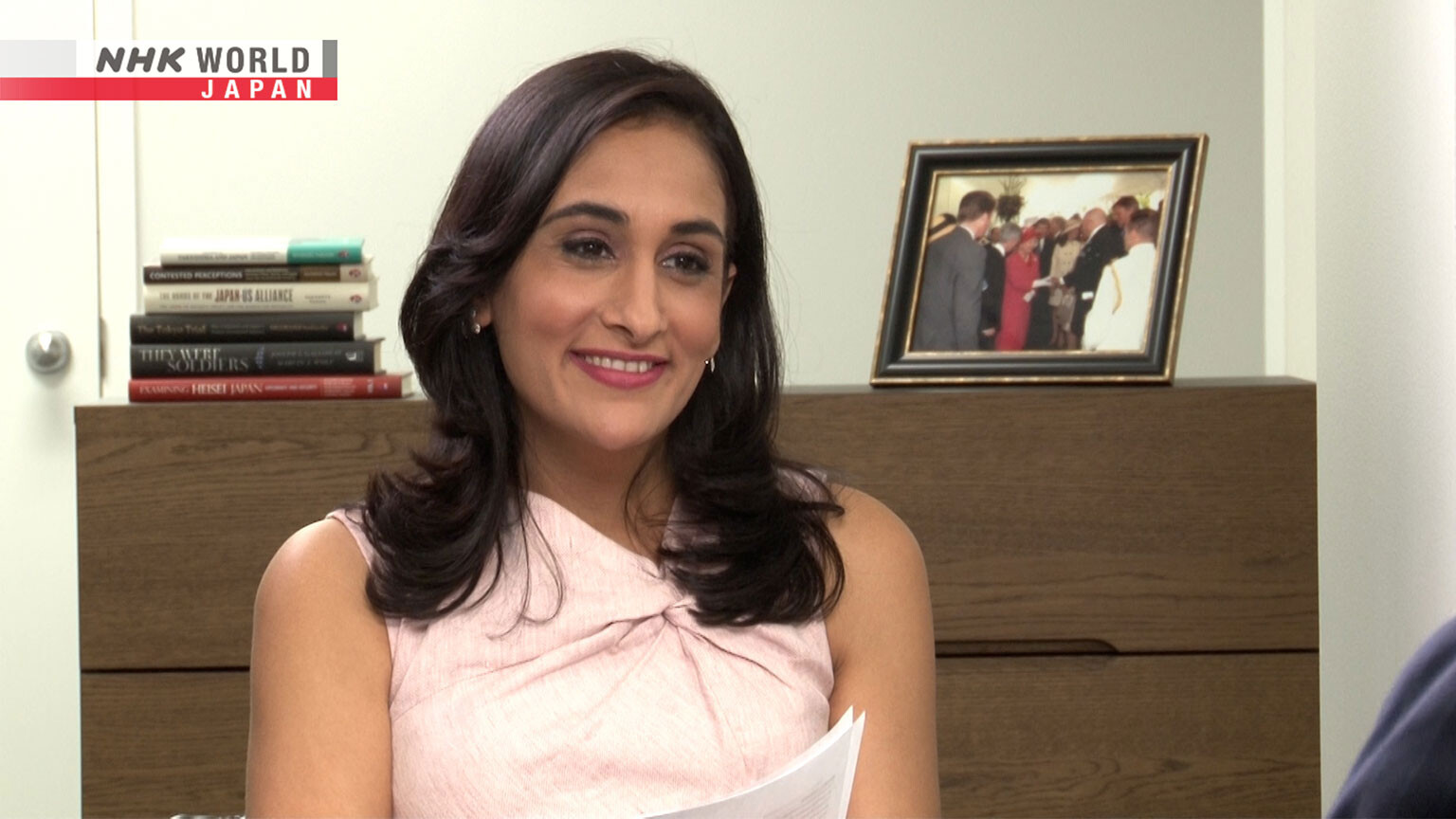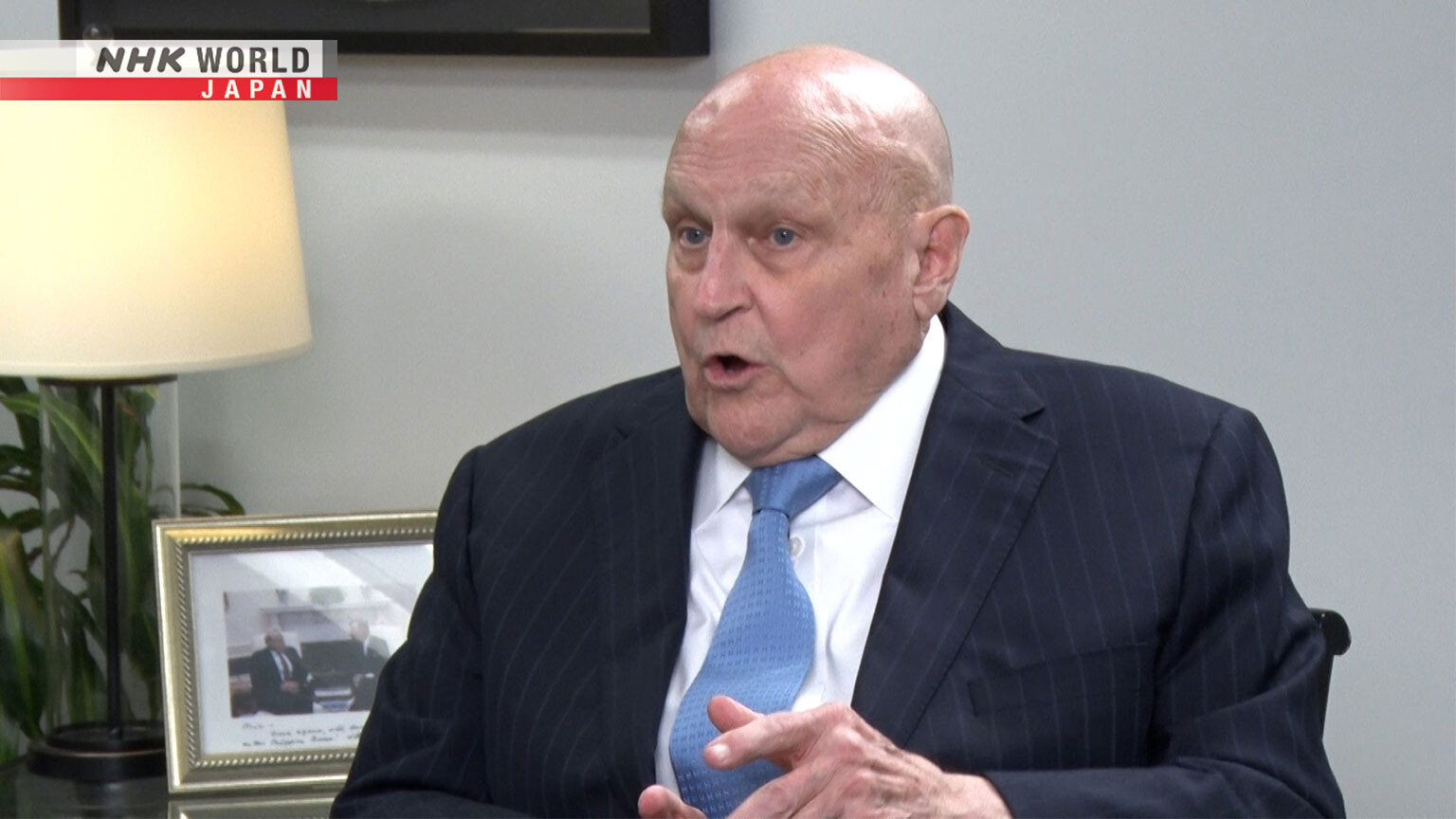Road Ahead for the Japan-US Alliance: Richard Armitage / Former US Deputy Secretary of State
As global events affect the security and stability of the Indo-Pacific, the Japan-US Alliance continues to be one of the most important partnerships. The two nations have committed to expand their engagement and address the world's most pressing challenges. Richard Armitage, former US Deputy Secretary of State, discusses the significance of the Japan-US Alliance, how it has developed over the years and the alliances' role as a global leader.

Del Irani
DEEPER LOOK Host

Richard Armitage
Former US Deputy Secretary of State
Transcript
Hello and welcome to DEEPER LOOK coming to you from Washington.
I'm Del Irani. It's great to have your company.
These cherry trees that line the US Capitol were a gift from Japan to the United States more than 100 years ago.
They are a symbol of friendship, which has seen many twists and turns over the years.
Recently, the Japan-US partnership was further cemented
by Japanese Prime Minister Fumio Kishida's official visit to Washington in April.
It was a key meeting amid rising tensions in the Indo-Pacific and globally.
So, how can the Japan-US Alliance confront the current global challenges?
And, just how has this alliance evolved over the years?
I'm meeting Richard Armitage, one of the foremost voices on Japan-US relations.
Mr. Armitage is former US Deputy Secretary of State who served under President George W. Bush.
For nearly 25 years, Mr. Armitage and his colleague Joseph Nye have led a bipartisan group
to develop blueprints for the Japan-US Alliance compiling the Armitage-Nye Reports.
The studies have served as an important roadmap for administrations of both countries,
with the sixth report being recently released.
Welcome to the program, Mr. Armitage, great to have you with us.
Thank you.
Mr. Armitage, one of the very first lines of your report really stood out to me.
It says that Japan and the US are confronted with a global environment
more fragmented and divided now than at any time since World War II.
So, given this scenario, your report says, "the Japan-US Alliance has never been more important."
Why is this the case?
I think it's quite simple.
We've never before faced together,
such a condominium of countries and potential foes as China, Russia, Iran, and North Korea.
And these all are involved not only globally, but in the Indo-Pacific.
So, from our points of view, Dr. Nye and my point of view,
this is the most fragmented we've seen in 75 years.
So, then why is the Japan-US Alliance more important now than ever?
Well, here are two countries, two very capable militaries,
who generally share the same views about a global order, law and order, democratization, respect for human rights.
All those things, make us even more closely allied ourselves,
but also make us make us stand out when we're looking at such potential enemies,
as the four countries I just made named.
Your most recent report, if you were to summarize,
what is the most important takeaway from this report,
as far as the alliance between Japan and the US playing a critical role in the Indo-Pacific?
I think the most critical single issue in the report is the fact
that the United States is intent on changing our command structure,
so that we can have US forces in Japan and in the Indo-Pacific area
solely dedicated to our alliance and the defense of Japan.
There's a more philosophical part of the report,
which shows that the US and Japan are ready to be more integrated,
hence to be a bigger factor on the global stage, particularly when there's a fear in Japan,
and frankly here in the United States of the possibility of a Trump administration,
and perhaps some isolationism.
The first Armitage-Nye Report was published in 2000.
That was just before you started serving as Deputy Secretary of State, and there have been five since.
First, I want to start with your personal viewpoint.
Tell me, Mr. Armitage, has it surprised you how enduring this relationship has been,
and some of the achievements over the last 24 years?
I've been surprised, frankly, at the rapid nature of the changes.
And when Joe and I had our first report, the year 2000, it was on the verge of a presidential election.
We didn't know who was going to win.
But we did know that whoever won was going to have to continue
to develop a good relationship between Japan and the United States.
At the time, we called it a partnership.
And since then, it's moved from partnership,
to Asian activities together to anchoring stability in Asia,
to dealing with our relationship, Japan and the US, in the 21st century -
moved from that to being able to work in a global partnership.
And this recent report, talks about an integrated Alliance,
that's no big brother, small brother, big sister, younger sister; an integrated alliance, of equals,
who need each other, and whose people need each other.
I want to go back to the time of the 9/11 attacks.
When you were the Deputy Secretary of State.
At that time, you said to Japan "show the flag."
And then when the invasion of Iraq began,
you told Japan that the US expected Japanese "boots on the ground."
What were you expecting from Japan? And were your expectations met?
My expectations were Japan,
whose first responsibility is to their own citizens
would recognize that Japanese died in the Twin Towers,
just like Americans, and citizens of other countries.
Japan would do what was necessary to protect them.
I did realize that the situation here in the US has changed enormously.
That one morning, we'd always been safe behind our two great oceans.
So, for us, this was a real new factor, something that introduced fear.
I knew that if Japan did not get involved in a global response,
particularly when we had NATO for the first time in history,
invoking Article Five and particularly because Japan had also lost citizens.
I wanted Japan to show the flag whether it was by Air Force, Navy, diplomatic effort,
that they were in with a global community to try to rid the scourge of terrorism.
In Baghdad, after our invasion, I thought it was important that Japan continue to show
they were part of the international community who is supporting the United States.
That's why I called for boots on the ground.
How did these two sentiments "boots on the ground,"
"show the flag," effect Japanese security policy?
The expectation was that we could erase the image that existed here about Japan,
after the first Gulf War, where Japan was only willing to step up with money.
I thought that Japan deserved a much better image than that of being a piggy bank.
So, I thought it was important that Japan jump in.
And it's given Japan the confidence now to be involved in issues, such as the anti-piracy in Djibouti,
it has given Japan the confidence to have a Prime Minister go to Ukraine, go to NATO, go to the EU.
It's given Japan the confidence to receive security cooperation
with Great Britain, Germany, France, Canada, the Philippines, Australia, and the US.
There used to be an argument you heard around the world,
and heard here that Japan was not a normal nation.
Whether you're talking about their approach to the economy and or anything else.
Well, they've proven themselves to be a normal nation
and one who is interested in the great affairs of our day.
We first saw "boots on the ground" in the early 2000s.
But now, Mr. Armitage, you're calling for "hulls in the water?"
What do you mean by this?
It's the analogue, if you will, "to boots on the ground."
International community has a big problem in the Red Sea.
The Houthis are shelling international shipping in the Red Sea.
Countries like the US, Great Britain, a few others are trying to keep the waterway open.
Japan is much more dependent on commerce through the Red Sea than, for instance, the United States.
So, we thought it appropriate, that here again, Japan take part in the great issues of the day,
by the minimum having a naval presence, to work alongside other friendly navies.
Let's talk about your latest report.
This is the one that was the most recently published.
That report states that the burdens of global and regional leadership
will fall more heavily on Tokyo in the near term.
What leadership role do you see Japan playing globally and in the region?
I think if you look at recent visits by Kishida "Sori" in Europe and other places.
And if you look at the number of first, Europeans and others travel to Tokyo,
you find that there's an expectation that should the United States - which is flirting a bit with isolationism - falter,
Japan will be a safe harbor as a nation which will hold on to democratic values, human rights appreciation, etc.
So, why is Japan well poised to take on this leadership role?
What is it about Japan that makes you believe
that they are the right ones to take a role globally and in the region?
Three successive Prime Ministers.
Mr. Abe, Mr. Suga and Mr. Kishida have expanded the international reach and interest of Japan.
This has been appreciated.
By taking a much more active part in cyber defense, cyber security, etc.,
it makes Japan ideally, poised to, at least for a time to, if not just assist,
to actually temporarily take the place of a distracted United States.
Mr. Armitage, we are months away from the US elections.
You were a member of the Republican party,
and you've gone on the record publicly speaking out against former President Donald Trump.
What concerns you most about the impact on the Japan-US Alliance
if former President Donald Trump is back in the White House?
Senator Hagerty at Tennessee, a senator from Tennessee,
former ambassador in Japan assures me, assures all of us that Mr. Trump is not an isolationist.
Well, that may be the case.
But he's transactional.
What impact could that have on the Japan-US Alliance?
Well, as I say, if he's transactional,
he'll still view our soldiers and sailors, marines and airmen in Japan as sort of mercenaries,
and that Japan should totally pay for that.
The United States is not in Japan, because of charity.
We're there for our interest because it's protective of our ability
to have security cooperation in all of the Indo-Pacific.
Mr. Armitage, what are your thoughts about the future of the Japan-US Alliance
if President Biden manages to get another term in the White House?
What are the implications of that?
I think the implications are further indications that Japan may continue on the path,
taking a broader and broader interest in global affairs,
realizing fully that the interest of Japan don't end at the water's edge.
Mr. Armitage, thank you so much for your time.
We'll leave it here for now.
But there's lots more to talk about.
Thank you.
Join us next time as we continue our conversation with Richard Armitage on DEEPER LOOK.
We'll look at ways to contain the growing geopolitical turmoil.
I'm Del Irani. Thanks for your company.
I'll see you then.